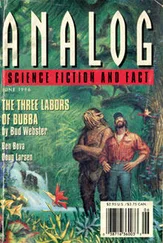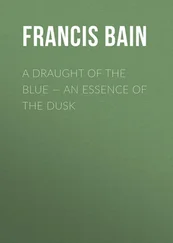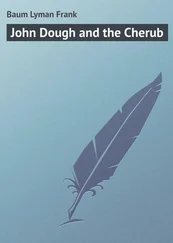Miss Fair has gone ahead and gotten herself married, to my heart’s sorrow, taking the vows with Mr. O. O. Beard, the genial (if rather epicene) scion of a zinc-mining family and also a passionate lover of ferns. (I was unable to attend the wedding due to my rigorous botanizing schedule, but the former Mrs. Quilcock attended and reported that a spirited time was had by all.) This marriage will produce no issue, obviously, but their wealth has allowed Mrs. Beard to pursue her scientific inquiries free from interference. Brava, I say. 27

C. B. Hoyt
C. B. Hoyt was referred to by his colleagues and students at Easterbrook College, Baltimore, as “Ol’ Beans and Tape.” Though the origins of the sobriquet are obscure, common sense suggests that “tape” derived from his insistence on proper techniques (i.e., no glue!) for specimen preservation on herbarium sheets. (Compare, at your peril, Petitfour’s likely choice of adhesive.) As for “beans,” I do not know; I shall limit myself to pointing out that Scottwell-Scott and I must not have been alone in thinking him a “windy” old gasbag.
Indeed, Hoyt was a past master in the use of hot air, as he demonstrated ceaselessly while chairing the North American Botanical Fellowship star-chamber proceedings against me, which were held in early 1916 in the aftermath of the Cates outrage. In the same proceeding, Hoyt and his footmen denied my claim against Prim in re primacy in re the discovery of Ptimorus “catesii.” (Of course, in my writings I have referred to the species by its rightful name, i.e., the one I had chosen for it: P. annasophii.) 28Scottwell-Scott, in his pained and miserable last days, roused himself from his sickbed to appear on my behalf, but he was in too compromised a state to make his points forcefully. I remain to this day convinced that I heard back-row snickers from Pickwick, Unterdorf, Prim, and Gjetost while Scottwell-Scott — frail, toothless, tubercular, and aphasic — valiantly defended my character and honesty. Reader, you should understand that a man does not easily forget such vile mistreatment of his mentor.
After the sham proceedings, I pursued remedies against Kingslee, Prim, Hoyt, and the Fellowship in the American civil court system — a Sisyphean endeavor if ever there was one. I served as my own attorney and, with a year or two of study, mastered tort law, in particular the case law regarding defamation, fraud, conversion, trespass to chattels, intentional infliction of emotional distress (and, in a later action, loss of consortium). Sadly, the legal system is also full to the brim with lickspittles, cowards, and toadies, and my efforts were fruitless.
In botanical matters, I find little fault with C. B. Hoyt’s work. He would have ranked among the field’s finest if he had not styled himself a gray-flanneled despot, lording over the world of plant taxonomy from his Baltimore throne. Power corrupts, yes, but it is only the corrupt who seek power in the first place.

Timothy Edward “Ted” Conklin
Conklin is a well-meaning and eager young pup, but to call him even a mediocre botanist would be a colossal act of charity. He is also a damnably persistent writer of missives to men of science whom he imagines to be his mentors.
I allowed him to accompany me into the field once, to my great disadvantage, because my contracted assistant had quit on the eve of the trek, citing the revelations in the Cates fiasco (which, again, will not be dignified with comment herein). I warned young Conklin as we prepared for our explorations on the rocky outcroppings of Lower California’s San Renaldo Bay that the terrain would be difficult, the weather unpredictable, the fauna hostile to our presence. He reassured me he was man enough for work, bouncing about on his toes and fluttering about the room and incessantly chirping gramercies, all in a mode of behavior unrecognizable to me as having any connection to masculinity.
In any event, off to the rocks of San Renaldo were we, and all was promising, as the area had recently enjoyed many steady, nourishing rains. We were crossing the first of many ridges when the boy suddenly cried out in pain, hopping ineffectually on one leg while a copperhead (known in the local jabber as “la vibora”) dangled from the other, its fangs firmly implanted in the meat of his ankle. I cried out myself (in exasperation), plucked the snake from his leg, decapitated it with my shovel, made a prompt and neat incision at the site of Conklin’s injury, sucked the poison out, applied a clean bandage firmly to the wound, and carried the hysterical child on my shoulders to the nearest malodorous pueblo, where I was forced to wait as he drifted in and out of consciousness.
When little Teddy finally could speak again, he said, “Professor Quilcock, you saved my life!”
“Quite so,” I said, “and you ruined a perfectly good day for herborizing.”
Despite such incontrovertible evidence that he lacks the tenacity and fortitude required for serious field botany, Conklin has persisted in his pipe dream of joining the ranks of credible plant taxonomists. I recently received word that he had described a new species and named it in my honor: Yuthremides quilcockii. This is unfortunate, as I can see no rational basis for distinguishing this from Y. pubescens, which was ably described by Scottwell-Scott while I was by his side at Cinco Fuentes in 1903.
Well, at least Conklin has successfully joined one group — that of the infernal splitters. Foul company, to be sure, but company nonetheless.

Anna Sophia Parker,
formerly Anna Sophia Kingslee,
formerly Anna Sophia Quilcock,
née Anna Sophia Parker
While prone to both hard-heartedness and questionable judgment in re her personal affairs, the former Mrs. Quilcock is an excellent botanist, and I have always had great respect for her intellect, field technique, taxonomic restraint, native-Texan “can-do” spirit, wavy chestnut locks, and graceful stride. Her career at Mulholland advanced nicely over the last decade, 29as she was amply rewarded for playing second fid-dle to her second husband. I have recently received word, though, that she has left academia, ended her marriage, and taken up residence in the wilds of the Sierra. No doubt speculation abounds as to which of her husband’s perfidies has driven her to take such dramatic action; propriety forbids me from making my guess publicly. (I will observe, though, that their son, the aspiring botanist Jonathan Parker Kingslee, 30has received his doctorate from Mulholland and begun his career promisingly with his excellent dissertation on the genus Ataraxidopsis, and that his mother need no longer worry about maintaining the appearances of the nefarious elder Kingslee’s career for the boy’s sake.) 31
Further the affiant saith not.

Slade Cates
Slade Cates was a reprobate, a grafter, a thug, and an even bigger fraud than his father, the infamous Colton Cates. Young Cates’s career in plant study was inexplicably encouraged by some who ought to have had more respect for the sanctity of our efforts (i.e., Prim, Gjetost, Kingslee), but it was cut short by his fittingly pathetic demise in a Wenatchee snowbank at the age of twenty-six. The barkeep who tossed him outside at closing time made a great contribution to science in doing so.
Читать дальше
















